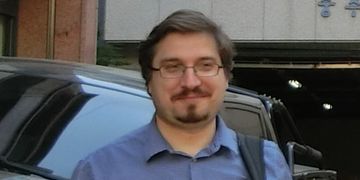Stan, can you help us untangle/unpack/understand the following endorsement by Professor Jakub Taylor of Fr. Robinson's book given on Fr. Robinson's website? See
https://therealistguide.com/endorsements.The endorsement -- don't you wish you had such a clear talking professor in college -- reads as follows:
Dr. Jakub Taylor

It is not an easy task to write a short endorsement of Fr. Robinson’s book, even if - in itself – the book is not a long opus. The difficulty lies in fear which I experience together with many commentators of the works of St. Thomas: it lies in a justified anxiety that the comment will become much less comprehensible in relation to the scrutinized original. But if, despite the lack of skill, I am to fulfill my task, I should follow a simple pattern of judgment and try to respond to two fundamental questions: does the author recognize the importance of a problem he is dealing with, and does he presents an adequate remedy. In my opinion, the answers to both of these questions appear to be positive. Let me try to explain why.
Chesterton used to mock modern men by saying that “like other barbarians, they really believe the mirror”; and therefore break it, hurting themselves and others in the process. Men have not changed from the time of Chesterton, it seems that human condition reached the bottom of the gnoseological abyss: most of us do believe that the reflections of the ‘mirrors’ represent the essence of being.
Fr. Robinson would agree with this assessment, as he considers the idealistic epistemology the source of most (if not all) contemporary problems, both within the parallel and vertical dimension of human reality. A remedy he proposes is simple: return to the realist cognition and focusing upon causa finita argumentation. Pointing out these two factors proves that author possesses a good intuition and perceptive abilities, features not shared by many. Why is focusing upon modus quo rather than modus quod so important? The way we approach reality is quintessential, as it determines our every-day praxis.
This fact is nicely put into words by a Polish contemporary poet, J.M. Rymkiewicz. In 2011, he expressed his frustration about the ongoing events by assessing the problem of the destruction of human identity, a disregard towards tradition, and the accomplishments of the past, while at the same time exaggerated, beautified ‘non-reality’ was being imposed by ‘deceivers and villains’. “Nothing is true anymore” - he writes emotively – “we have fiduciary economy, irrelevant problems presented to us as relevant, fictitious state agencies administered by a fictitious government… Even unimportant details of this ‘non-reality’ are nothing but the shards of thoughts of the un-real authorities and un-real literati, who preach to us that this ‘non-reality’ is indeed the essence of what is”.
Polish poets are not philosophers or scholars when it comes to guarding their tongues, but from time to time they manage to name the problem more accurately than others. Rymkiewicz called this phenomenon a “Great [Cognitive] Darkening”, which is a term semantically close to what Gordon Wood called an ‘Epistemological Revolution’.
Fr. Robinson, following the great tradition of Christian Aristotelianism and thoughts of the erudite English-speaking apologists, managed to describe the very same problem taking the philosophical deductive approach. Comparing to either Rymkiewicz or Wood he did it in much more coherent and compact fashion. Not many thinkers today are capable of such a feat, as most of them shiver in fear at being considered ‘judgmental’ or they pursue the feeling of safety within the ontological realm of ‘concepts’, doing anything to avoid suspicion of being called ‘axiom-obsessed supporters of foundationalism’. Fr. Robinson knows that talking about the absoluteness of truth is not very pleasant to a modern scholar, especially when it challenges the established lie (often sugar-coated by the term ‘paradigm’), but it is – de facto – a very scholarly thing to do. In my opinion, the author of the “Guide” deserves praise for this attempt, as well as for his attachment to the aleithia-oriented philosophical tradition. The fact that he was capable to interweave his very specific (I dare even say ‘sarcastic’) sense of humor within the precise philosophical narration is even more praiseworthy and should be highly regarded by the readers.
If I were to point out the feature of the book that I regarded most highly it would be the following: within the Anglo-Saxon worldview, any epistemological discourse will often end up facing the alleged dichotomy between the realm of religion and the realm of science. It is an obvious categorical shift problem intrinsically affiliated with the Euler diagram. I was very happy to find this issue addressed in the book. I had an impression, that Fr. Robinson, unlike many of his contemporaries, was quite successful in explaining this issue.
Even if Fr. Robinson’s critique of contemporary scholarship might appear to be too harsh, one might at least hope that it will lead scientists to avoid advocacy research, and build their theorems upon the realistic basis or, at least, to encroach the realm of philosophy or theology only after an adequate theoretical preparation. It might be nothing but an expression of my enormous naivete, but I dare to assume that if this guide is to be followed by other works of this kind, there is a chance of effective propagation of realistic thinking not only among the amateur philosophers, but even among us, professional concept-making academicians. A daring think to hope indeed! And I thank Fr. Robinson for giving me this hope by writing his extraordinary book.
Jakub Taylor is a research professor in the Academy of East Asian Studies at Sungkyunkwan University, in Seoul, South Korea. [Would it be uncharitable to hope that he remain there?]